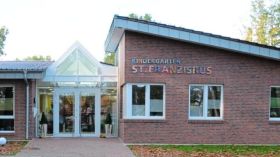Daily Schedule
The daily routine of the Kita St. Franziskus Schöninghsdorf begins with the arrival phase. The children who do not attend marginal times (7:15 - 7:45 a.m.) can come to the daycare center from 7:45 a.m. on. Here they first put on their slippers and hang their bag and jacket on their checkroom sign. After being greeted by the group teachers, the children can move on to the free play phase. By 8:30 a.m., all children should have been brought in.
At about 9:00 a.m., the morning circle takes place within the groups. Here, the children are introduced to the day's activities and are allowed to decide for themselves whether and in which activities they will participate.
After the morning circle, all groups meet in the movement room for the "big morning circle". Here, a welcome song is sung, birthday children are honored, and finally, all open questions about the activities are discussed. Afterwards, the free play phase can begin.
Throughout the morning, the children have the opportunity to choose the time of their breakfast. Our open café is available for this purpose.
Starting at 12:00 p.m., the children clean up. The children then go to their home groups until 12:45 p.m. for the final circle.
In the pick-up phase, the morning children are picked up punctually between 12:30 and 12:45. The full-day children prepare for lunch.
After lunch, the all-day group offers various activities and the opportunity for free play. Until they are then picked up at 14:00 or between 15:30 - 15:45.








